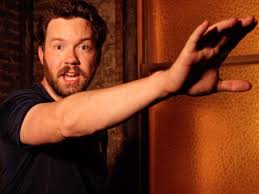
Tottenham was once a quiet semi-rural suburb north of London where Charlie's parents lived in a bungalow with a back-yard garden abutting forests teeming with wildlife. Their son now lives in a former government housing project undergoing gentrification, having landed a posh corporate job requiring him to dress expensively, commute daily to the city's financial district, drink with the lads after work and neglect his girl friend. With the onset of economic recession, however, office politics take on a draconian severity, leaving him unemployed and abandoned, his beloved Alex having moved on and out. Reeling under the shock of these sudden lifestyle changes, Charlie's thoughts turn to his childhood memories of the wild fox who came to embody a pastoral deity offering him comfort in a cruel world—unlike the four-footed urban scavengers whose encroachment on human domains was once limited to the occasional spilled garbage can, but have now been sighted roaming stairwells, invading kitchens, attacking house cats, even molesting babies in cradles. Charlie's neighbors, too, are growing more resentful of these intruders, advocating the "culling" of these feral predators in genocidal language blurring the distinction between animal and human nuisances. As crime, riots and civil unrest intensifies, Charlie himself begins to experience visions of vulpine recruiters inviting him to join in their desperate bid for survival. If this were a Hollywood movie, we would soon find ourselves bearing witness to brush-tailed CGI-generated Reynards striving to impose an aura of bloodthirsty savagery upon our image of foxes as cuddly russet-pelted lap fauna. Fortunately, Titas Halder has written his tale of creeping horror as a first-person solo narrative, recounted by its lone chronicler from his DIY bunker as he surveys the chaos unfolding in the streets below. Paranoia may be a commonplace phenomenon nowadays, but invocation thereof is still not an easy task for a single voice within the restricted environments mandated by current health codes. Actor Gage Wallace and director Elly Green are not afraid of extremity in emotional expression—whispering to us with face right up to the camera, for example, or struggling in the throes of a fight to the death against an otherworldly adversary.
Assistance in conveying the impending holocaust lurking in the shadows, revealed only by the war cries of marauders in the night, is provided by sound designer Daniel Etti-Williams, director of photography Kamille Dawkins and film editor Kyle Hamman.
Has Halder crafted an allegory of social breakdown ( cf. Rhinoceros) or a grim reminder of nature's brutality (cf. “Watership Down”)? Do his anthropomorphic manifestations reflect the literary device called magic realism, or hallucinations associated with insomnia-induced psychosis? Are the violent atrocities that Charlie describes actual or imaginary? More important, how do the events of the 1980s in the UK apply to us today, our own country ravaged by hostile factions? Whose side will we take?
